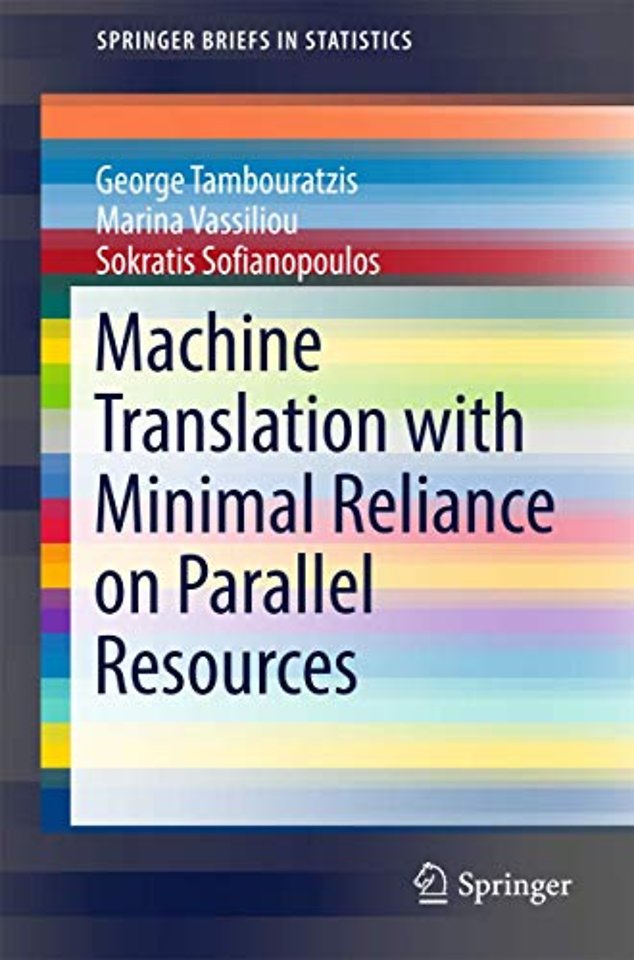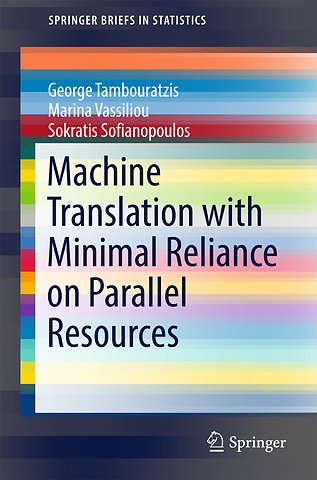


George Tambouratzis graduated from the Electrical Engeneering Department of the National Technical University of Athens (1989), and received his M.
Meer over de auteursMachine Translation with Minimal Reliance on Parallel Resources
Paperback Engels 2017 1e druk 9783319631059Samenvatting
This book provides a unified view on a new methodology for Machine Translation (MT). This methodology extracts information from widely available resources (extensive monolingual corpora) while only assuming the existence of a very limited parallel corpus, thus having a unique starting point to Statistical Machine Translation (SMT).
In this book, a detailed presentation of the methodology principles and system architecture is followed by a series of experiments, where the proposed system is compared to other MT systems using a set of established metrics including BLEU, NIST, Meteor and TER. Additionally, a free-to-use code is available, that allows the creation of new MT systems. The volume is addressed to both language professionals and researchers. Prerequisites for the readers are very limited and include a basic understanding of the machine translation as well as of the basic tools of natural language processing.
Trefwoorden
Specificaties
Lezersrecensies
Over Marina Vassiliou
Over Sokratis Sofianopoulos
Inhoudsopgave
U kunt van deze inhoudsopgave een PDF downloaden
1.1 Challenges in MT—Relevance to the European Environment 1
1.2 A Brief Review of MT Development History 3
1.3 Advantages and Disadvantages of Main MT Paradigms 4
1.4 The PRESEMT Methodology in a Nutshell 7
1.5 Closing Note on Implementation 9
References 9
2 Implementation 11
2.1 Introduction: Summary of the Approach 11
2.2 Linguistic Resources: Data and Existing Linguistic Tools 13
2.2.1 External Processing Tools 13
2.2.2 Lemma-Based Bilingual Dictionary 15
2.2.3 The Parallel Corpus 15
2.2.4 The TL Monolingual Corpus 17
2.3 Processing the Parallel Corpus 19
2.3.1 Phrase Aligner Module 19
2.3.2 Phrasing Model Generation 24
2.4 Creating a Language Model for the Target Language 26
References 27
3 Main Translation Process 29
3.1 Introduction 29
3.2 Translation Phase One: Structure Selection 30
3.2.1 The Dynamic Programming Algorithm 32
3.2.2 Example of How Structure Selection Works 34
3.3 Phase Two: Translation Equivalent Selection 35
3.3.1 Applying the Language Model to the Task 37
3.3.2 Example of How TES Works 39
References 40
4 Assessing PRESEMT 43
4.1 Evaluation Dataset 44
4.2 Objective Evaluation Metrics 44
4.3 System Evaluation 45
4.3.1 Evaluation Objectives 45
4.3.2 Evaluation Results 46
4.3.3 Expanding the Comparison 47
4.3.4 Experimenting with Further Data 47
4.4 Comparing PRESEMT to Other MT Systems 49
4.5 Conclusions 52
References 53
5 Expanding the System 55
5.1 Preparing the System for New Language Pairs 56
5.2 Examining Language-Pair-Specific Issues 57
5.2.1 Agreement Within a Nominal Phrase 58
5.2.2 Case Mismatches 58
5.2.3 The Null-Subject Parameter 58
5.2.4 Word Order 59
5.3 Notes on Implementation 60
5.4 Conclusions 60
References 61
6 Extensions to the PRESEMT Methodology 63
6.1 Splitting SL Sentences into Phrases More Accurately 63
6.1.1 Design and Implementation of TEM 64
6.1.2 Experimental Evaluation 67
6.1.3 Conclusions 68
6.2 Combining Language Models of Different Granularity 69
6.2.1 Extracting the N-Gram Models 71
6.2.2 Experimental Results 72
6.2.3 Discussion 74
References 74
7 Conclusions and Future Work 77
7.1 Review of the Effectiveness of the PRESEMT Methodology 77
7.2 Likely Avenues for Improvements in Translation Quality 78
7.2.1 Automatic Enrichment of Dictionary 79
7.2.2 Design and Implementation of TEM 79
7.2.3 Grouping of Tokens and PoS Tags into Related Classes 80
7.2.4 Revision of the Structure Selection Translation Phase 81
7.2.5 Improving the Alignment of Words/Phrases 82
7.2.6 Augmenting the TL Language Model to Cover Supra-Phrasal Segments 82
7.2.7 A Closing Evaluation of Translation Accuracy 83
References 84
Glossary 87
Anderen die dit boek kochten, kochten ook
Rubrieken
- advisering
- algemeen management
- coaching en trainen
- communicatie en media
- economie
- financieel management
- inkoop en logistiek
- internet en social media
- it-management / ict
- juridisch
- leiderschap
- marketing
- mens en maatschappij
- non-profit
- ondernemen
- organisatiekunde
- personal finance
- personeelsmanagement
- persoonlijke effectiviteit
- projectmanagement
- psychologie
- reclame en verkoop
- strategisch management
- verandermanagement
- werk en loopbaan





